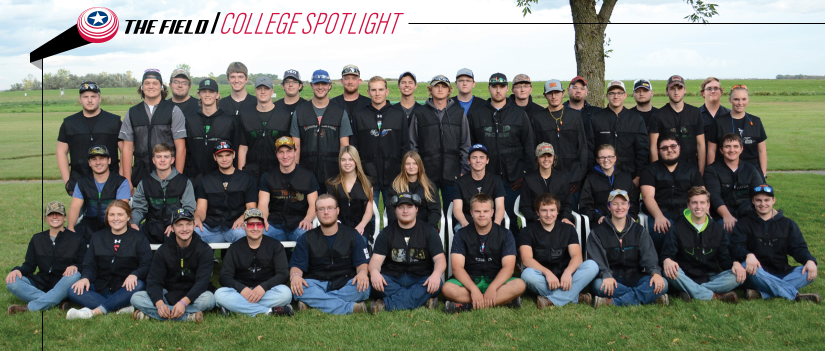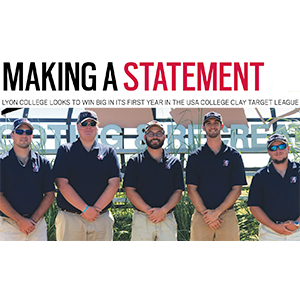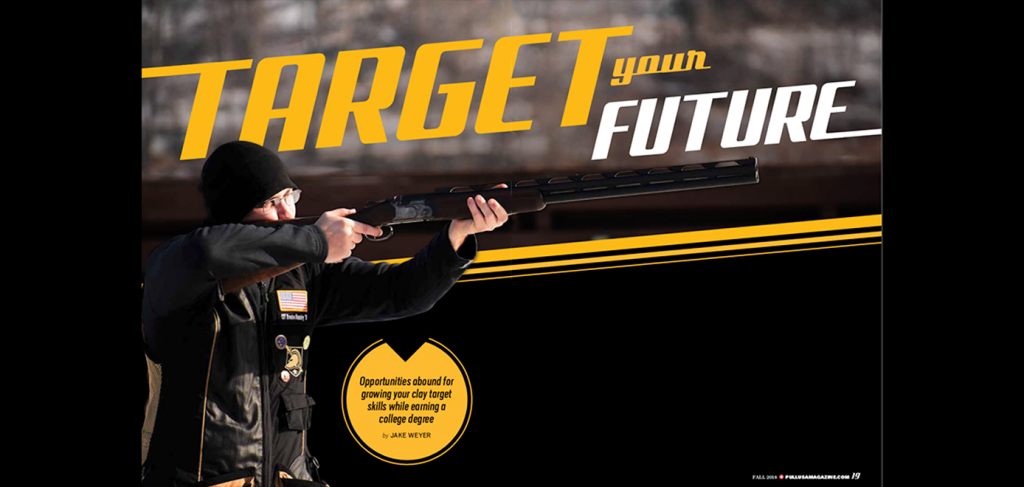
By Jake Weyer and Andrew Tri
Ask anyone involved in college clay target sports what to look for when making your choice for higher education and they’ll tell you it has nothing to do with shooting.
“Pick a school that has a good program for what you would like to study,” says Connor Nikkola, president of the Colorado State University Shotgun Sports Team. “Although shooting may be a big part of your life right now, ultimately, the end goal is to get a degree and a career.”
But that doesn’t mean you can’t continue the sport you love. Many colleges—both two-year and four-year institutions—offer clay target programs, either as clubs or school sports.
The League is doing its part to grow those opportunities, an example of which is the recent partnership with the Minnesota College Athletic Conference to make clay target shooting a sanctioned varsity sport. Separately, the new USA College Clay Target League now provides the opportunity for any college to compete virtually with other area institutions, just as is done at
the high school level.
The bottom line: clay target shooting doesn’t have to end with high school. You can continue to grow your shooting skills while preparing for your career, and being involved on a clay target team can actually help in a variety of other ways.
“Students who continue to pursue their hobbies and passions during college often find the transition to college much smoother,” says Rebekah Summer, director of institutional research and communications at Alexandria Technical and Community College in Alexandria, Minnesota.
Being part of a trap team, like any organization, helps students connect with others outside of class and build lasting relationships, Summer says. Nikkola is an example of that.
“Shooting in college at CSU has been one of the best experiences of my life,” says the senior, studying fish and wildlife biology. “I have been all over the Midwest competing and making new friends. I would not trade the experiences I have had with my team for anything. As serious as we are we also love to have fun and that is what our team is about.”
In addition to fun, clay target shooting at the college level can contribute to real personal growth as students prepare for life beyond campus, says Rob Person, an international relations professor who co-coaches the West Point Skeet & Trap team.
“As a competitive sport, collegiate clay target shooting can cultivate the competitive instinct and winning spirit in young men and women that will pay dividends in many other spheres of life,” Person says. “Importantly, it’s a form of competition that men and women can enjoy throughout their lives. Unlike many sports, shooting competitively in college can be the beginning—not the end—of one’s competitive career.”
With thousands of colleges and universities across the U.S., finding the best fit for you takes extensive research and careful consideration. But to give you a taste of what clay target opportunities are available, here’s a small sampling of colleges with established teams.
University of Alabama

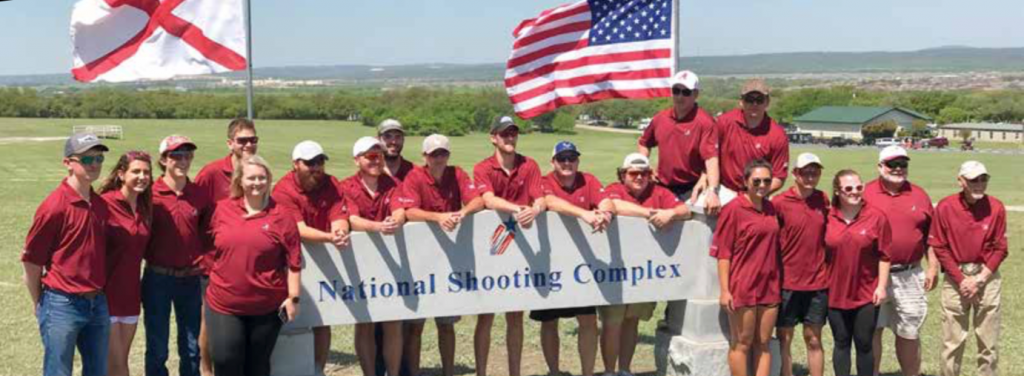
Founded in 1831, the University of Alabama is the oldest and largest public university in the state, and the flagship of the University of Alabama system. Well known for its highly ranked athletic programs, the university also has more than 500 student organizations to be a part of. It’s also recognized for programs in business, law, marketing, communication, journalism, health professions and more. The clay target team got its start in 2013 and began competing in national competitions in 2014. It started as a group of hunters who wanted something to do as friends in the offseason, but is now made up of some of the best shooters in the country. The team is competitive and within arms’ reach of national titles. Its practice facility for skeet and trap is Southern Skeet & Trap in Irondale, Alabama, about an hour from campus. The team is working on getting its own range in Tuscaloosa.
UNDERGRADUATE TUITION: $10,780 in-state; $29,230 out-of-state; merit scholarships also available for out-of-state students based on high school GPA and ACT/SAT scores
TEAM COST: $200 per semester, which covers ammunition and membership at practice facilities.
COLLEGE WEBSITE: ua.edu
Alexandria Technical and Community College

Alexandria Technical and Community College (ATCC) is known for its hands on, applied learning across a variety of skilled, high demand technical and career programs. The college and the community provide a safe and supportive environment for education and recreation in west central Minnesota. ATCC continues to explore options that enhance the experience of its students. In 2019, the trap club, founded in 2015, will become an intercollegiate varsity sport,
allowing students to compete across the state and beyond.
UNDERGRADUATE TUITION: $5,416
TEAM COST: None. Student fees currently cover costs to use Alexandria Shooting Club. Students provide their own ammunition.
COLLEGE WEBSITE: alextech.edu
Arizona State University

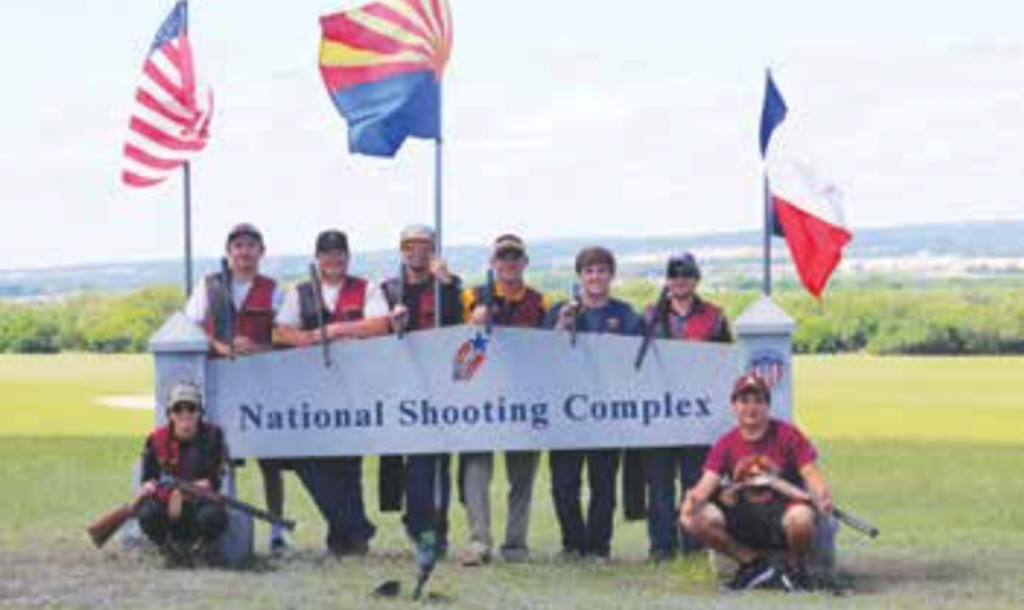
Arizona State University is a sprawling five-campus institution based in Tempe, Ariz., which boasts the country’s largest college enrollment at nearly 72,000 students. Of the school’s roughly 350 degree programs, popular majors include business, marketing, and engineering. The university prides itself on a reputation for innovation and research. The shooting team, named the Gun Devils, started in 2012 with eight participants and has grown to more than 45. In a short period of time, the team has hauled in numerous trophies and medals from Association of College Unions International competition. The team practices at Ben Avery Shooting Facility in Phoenix.
UNDERGRADUATE TUITION: $27,009 in-state; $43,859 out-of-state
TEAM COST: $200, which covers administrative costs. Grants take
care of ammunition, targets, travel, and entry fees.
COLLEGE WEBSITE: asu.edu
University of Colorado-Boulder

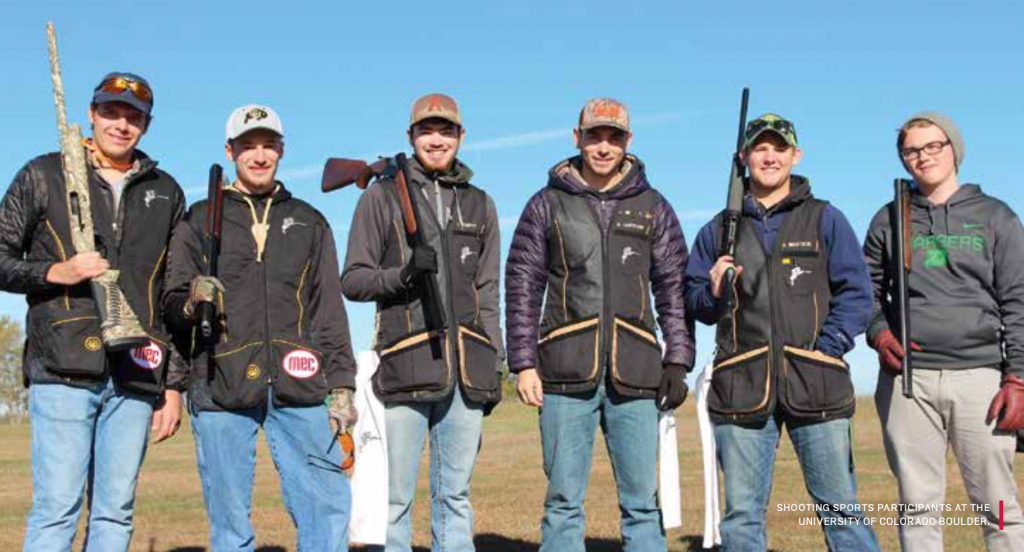
Located where the Rocky Mountains meet the Great Plains, the University of Colorado Boulder is an outdoor enthusiast’s dream. The school itself is one of the top engineering colleges in the country, and is also known for biological and biomedical sciences, business, management, marketing, social sciences, and more. Inspired by Colorado State University’s long-established team, the Boulder Shooting Sports squad was assembled in 2014. The goal was to create a group that was fun, flexible, competitive, and welcoming to all. The club’s home range is Colorado Clays in Brighton, Colorado, about 30 minutes from campus. The team travels to 3–5 competitions every semester.
UNDERGRADUATE TUITION: $28,750 in-state; $53,504 out-of-state
TEAM COST: $75 per semester, which covers team gear, discounted
ammunition and range fees, and other costs.
COLLEGE WEBSITE: colorado.edu
Colorado State University

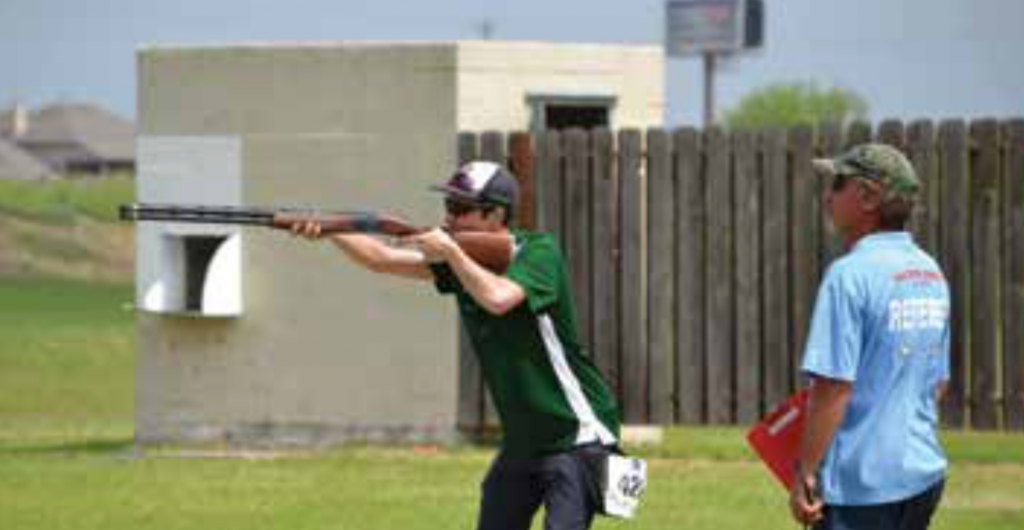
Known for its programs in natural resources, engineering, health and exercise science, and business, Colorado State is a four-year school with many other degree offerings in just about any field you can think of. And with mountains, prairies and forests just outside of town, the school is great for anyone who loves the outdoors. The college’s shooting sports program was founded in 1979. Its mission is to introduce students to the clay target sports of trap, skeet, and sporting clays, and to facilitate their continued involvement. The team practices at Great Guns Sporting in Nunn, Colorado, about 40 minutes east of campus.
UNDERGRADUATE TUITION: $12,000 in-state; $29,000 out-of-state
TEAM COST: $165 annually
COLLEGE WEBSITE: colostate.edu
Eastern Oregon University

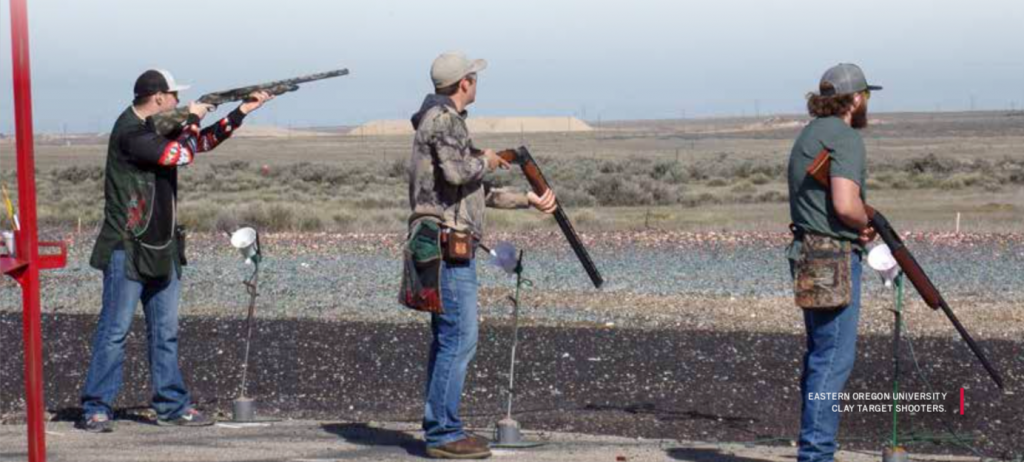
Eastern Oregon University is a public university located in the Blue Mountains in eastern Oregon, surrounded by hunting and recreational opportunities. The location lends itself well to outdoors-related programs, including an Outdoor Recreation and Leadership minor and an Outdoor Adventure Program that o ers whitewater rafting, archery and more. Many shooters at the college grew up hunting game birds, waterfowl and big game. All are members of the La Grande Gun Club, which is 7 minutes from campus. The team got its start in 2015 and competed for the first time in 2017.
UNDERGRADUATE TUITION: $18,624 in-state; $21,924 out-of-state
TEAM COST: The university covers all shooting fees, shells and travel
with the help of an NRA grant. The team also has a few guns that can
be loaned during events.
COLLEGE WEBSITE: eou.edu
Iowa Lakes Community College

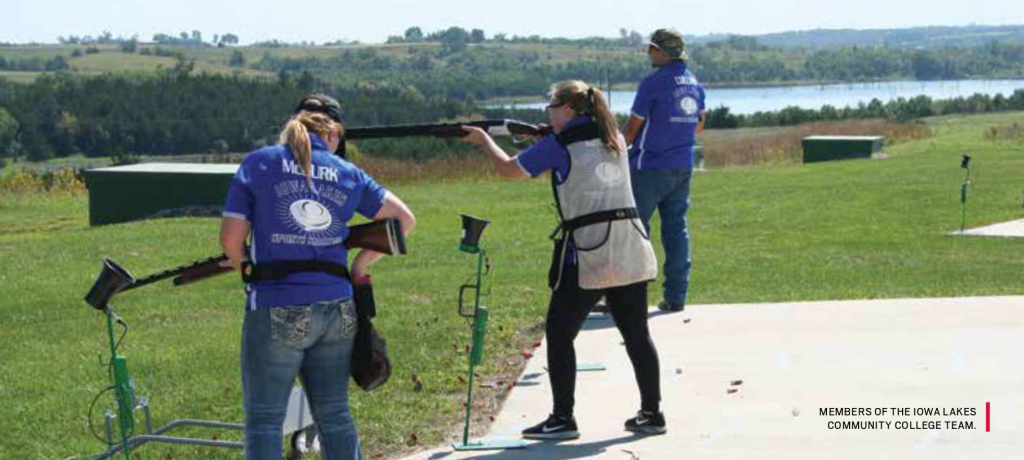
With several locations across a five-county area in the Iowa Great Lakes Region, Iowa Lakes Community College offers more than 100 career and pre-professional programs in fields including business, health and medical, industry and safety, and more. This year was the shooting team’s first as a competitive intercollegiate sports shooting team—trap shooting was a club sport previously. The team practices at Palo Alto Gun Club, about 7 miles east of the Emmetsburg campus.
UNDERGRADUATE TUITION: $179 per credit hour
TEAM COST: $100, which covers dues, practice targets and ammunition, shooting shirts, competition entry fees, and meals. Scholarships are available.
COLLEGE WEBSITE: iowalakes.edu
Mount Marty College

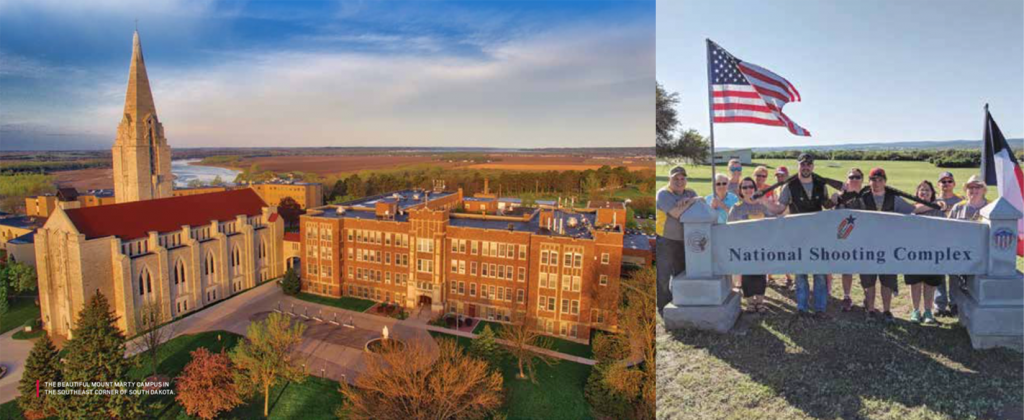
Located on the Missouri River blu s in southeastern South Dakota,Mount Marty is a private, four-year, Catholic Benedictine college.Students enjoy close access to the outdoors and national state parks, hunting, fishing, and hiking miles from campus. Popular programs include nursing and health care, recreation management and tourism, business, education, criminal justice and more. In 2018, the shotgun sports program became the only collegiate, varsity team in South Dakota. The team practices at two local facilities and competes at regional and national ACUI competitions. Talent scholarships are awarded for varsity team members, and more than 95 percent of students receive academic-based scholarships.
UNDERGRADUATE TUITION: $34,156 (average net price is $17,026)
TEAM COST: The program pays for targets, travel, entry fees, etc. and
raises funds to help offset the cost. Loaner firearms are available to be
used for practice and events.
COLLEGE WEBSITE: mtmc.edu
Pine Technical and Community College

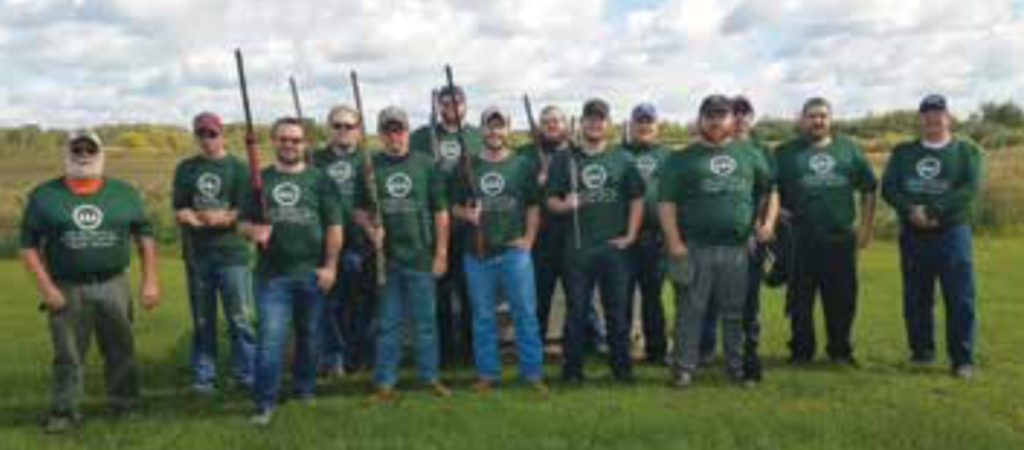
Situated on 21 acres about an hour north of the Twin Cities, Pine Technical and Community College is known for its innovation and community contributions, providing a variety of career programs as well as general education and skills training. The school is one of just a few in the nation that o ers a gunsmithing and firearms technology program. The Shooters Association, a student group from that gunsmithing program, runs the trap team currently, but an independent club is in the works. The coaches are all NRA-certified shotgun coaches with years of experience instructing both high school and college students.
UNDERGRADUATE TUITION: $5,000
TEAM COST: $225, which covers all registrations, targets, uniform
shirts, ammunition and championship costs. The college is looking to
reduce that cost through fundraising efforts.
COLLEGE WEBSITE: pine.edu
West Point


The United States Military Academy is a fully accredited four-year liberal arts college, but what makes it unique is that all cadets are commissioned as Second Lieutenants in the U.S. Army upon graduation. Rather than paying tuition, graduates commit to serve in the Army for five years on active duty and three years on reserve duty. Acceptance into West Point is highly competitive. The West Point Skeet & Trap Team was founded in 1938 by Captain Charles King,
who recognized the potential military benefits of training future Army officers to track and shoot aerial targets. King died in 1944 in Normandy, France, but the West Point Skeet & Trap Team has continued to train cadets to this day. The team has its own range and clubhouse as part of West Point’s military training facilities, which includes one trap field, one standard skeet field, and one “combination field” that can support skeet and trap.
UNDERGRADUATE TUITION: None
TEAM COST: None
COLLEGE WEBSITE: westpoint.edu
Yale University

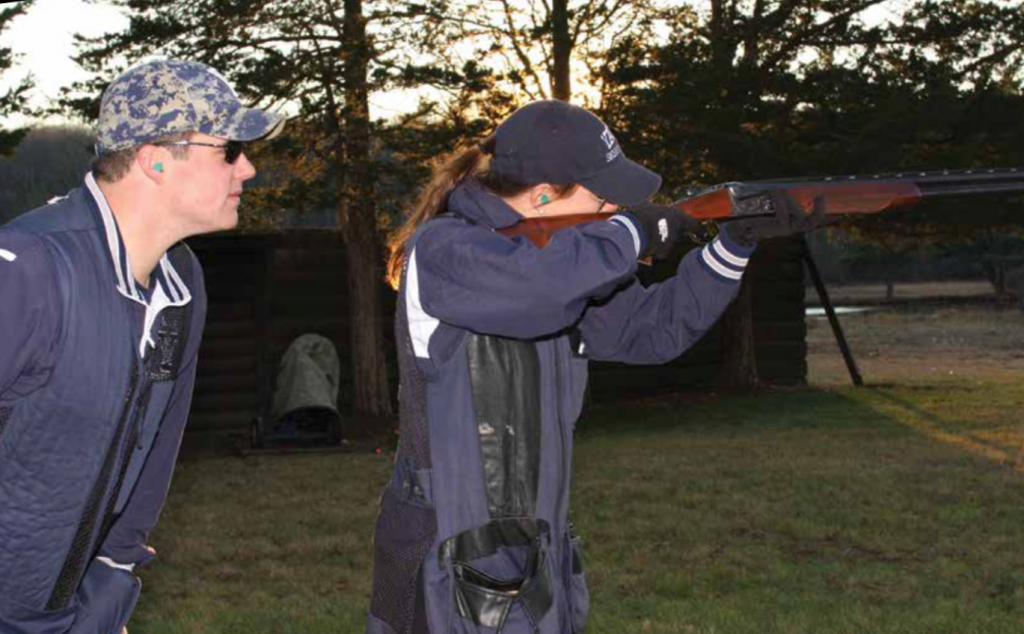
Yale University is more than 300 years old and largely considered to be one of the most prestigious universities in the world. It offers a wide range of programs, but is popular for social sciences, history, ethnic, cultural, gender, and group studies, and more. Yale’s athletic programs are also highly regarded and have a long history. At nearly 140 years old, the Yale Skeet & Trap team is no exception. Roughly 10–15 individuals are interviewed for open spots on the team each year, with maturity, dedication, appreciation, safety, and positive attitude among the preferred qualifications. The team is competitive, especially against its Ivy League rival, Harvard. It practices on a section of the Yale Outdoor Education Center in East Lyme, about 45 minutes from campus.
UNDERGRADUATE TUITION: $53,430
TEAM COST: Members pay for targets, ammunition, shooting gear
and transportation. Travel expenses, trap and skeet machines, team
firearms and facility renovations are dependent on fundraising.
COLLEGE WEBSITE: yale.edu


